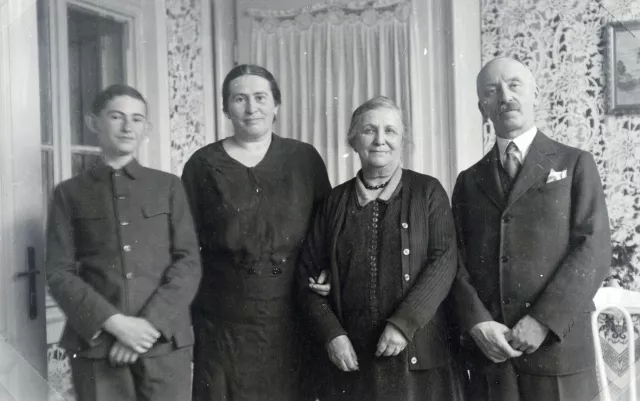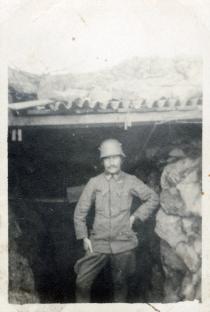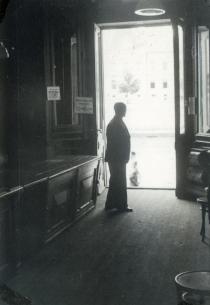This is Gyula Deutsch, my future husband (first from the left) in the Papiu high school uniform, so he was still a student. There's also his father Samuel Deutsch (first from right), his mother Margit Deutsch (second from left) and hisgrandmother - I think his mother's mother. She lived with them, but I don't know anything else about her. It's possible they took this picture inside their house in Szaszregen, but I've never been there. And probably Laci Deutsch, my husband's brother took the picture because he is not in it. There's no date on the picture.
Gyula's grandparents were originally from Nagyabony, Hungary, but I don't know when they came to Szaszregen. The wife of the furniture factory owner, Mestitz, and Gyula's mother were sisters. Gyula had an older brother, Laci Deutsch. The family lived both in Szaszregen and in Marosvasarhely. They were wealthy; they owned a textile store in Szaszregen, which was founded by Gyula's grandparents at the end of the 1880s. They also had a store here in Marosvasarhely. This branch - which was on the main square, on the corner of Posta Street, where the Bernady statue stands today - was opened much later and was closed quite early, because they hired a manager who couldn't manage it properly.
My husband was born in 1918. During the time Gyula, my husband, went to school they already lived here in Marosvasarhely. He didn't go to the Jewish elementary school, but to a normal one, but I don't know why, because by the time he started school the Jewish school already existed. After finishing the four years of elementary school he went to Papiu Lyceum, where he graduated from in 1936. His parents lived here all this time. During the week his father used to manage the store in Regen, and he came back on Friday evenings because on Saturdays all the Jewish stores were closed, while Sunday was an official holiday. He used to stay in the city until Sunday evening or Monday morning, when he went back. As far as I know, they kept a kosher household, and they too were Neolog, and not Orthodox Jews. They observed the holidays. I think Gyula's family used to go to the synagogue on Saturdays. Gyula had a bar mitzvah and his brother too, or so he told me. At home they talked in Hungarian, but in German too, as everyone in his family spoke German well.
I don't know exactly in which year they moved back to Regen. Gyula worked in the store, and helped out his father, while he was attending the university in Kolozsvar, taking correspondence classes - that is, he studied at home and only went to the university for exams - at the Law School, from which he graduated. Back in Regen his father taught him his profession and he only went to Kolozsvar during the examination period. He told me children were educated very strictly back then. He used to play tennis; that was his recreation. He met his friends on these occasions; otherwise he was very busy with his work.
Gyula began studying to take his doctorate, and I think he had only one or two exams left, but then he was taken to forced labor, along with his brother Laci, in 1942. They first went to Maramarossziget, then to Hungary. They also worked in Nagybanya, Szentkiralyszabadja [in Hungary], in Poland and Subcarpathia. They were together all the time, and they were liberated together. I think they came home already at the end of 1944, and luckily they pulled through the rest of it.
Gyula told me his grandmother lived with them in Szaszregen. I don't know any more exactly, whether she was his paternal or maternal grandmother. There was a Romanian family there - customers of the store, I believe that's how they knew each other -, and they lived in a very remote place in a nearby village. They wanted to hide Gyula's parents from deportation, but they didn't want to accept the grandmother. The parents couldn't accept that because they didn't want to leave the grandmother by herself, and unfortunately they remained in Regen. They were all deported: father, mother and grandmother, and all ended up in the gas chamber. If they had accepted the offer then, they would have probably escaped, because it was such a remote place, that there was no sign of the war; no Germans, Russians or anybody else went there.
I got acquainted with Gyula after World War II, and since his parents and his grandmother never came home from Auschwitz, I never met them.
Gyula Deutsch's family
Share
Photos from this interviewee
The Centropa Collection at USHMM
The Centropa archive has been acquired by the United States Holocaust Memorial Museum in Washington, DC.
USHMM will soon offer a Special Collections page for Centropa.
Academics please note: USHMM can provide you with original language word-for-word transcripts and high resolution photographs. All publications should be credited: "From the Centropa Collection at the United States Memorial Museum in Washington, DC". Please contact collection [at] centropa.org.






























